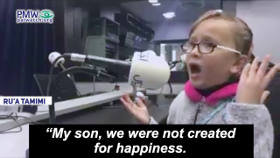Extreme Palestinian child abuse! Mom tells her son he is destined for Martyrdom - in girl's poem
- “My son, we were not created for happiness. In my eyes, you are meant for Martyrdom!”
- “Our weapon is our Islam, and our ammunition is our children. And you, O my son, are meant for Martyrdom.”
“My son, we were not created for happiness. In my eyes, you are meant for Martyrdom!”This is one of the abusive messages in a poem recited by a young girl on Palestinian radio that Abbas’ Fatah Movement chose to share with its 250,000 followers on Facebook. A second message in the poem that is clear child abuse tells Palestinian children why they are to die as Martyrs: They are merely the “ammunition” for Islam – the “weapon" with which to liberate and conquer Jerusalem.
[Official Fatah Facebook page, Nov. 22, 2019]
“Jerusalem is ours, our weapon is our Islam, and our ammunition is our children. And you, O my son, are meant for Martyrdom.”The ideologies expressed in this poem illustrate the Palestinian Authority’s abuse of its own children that Palestinian Media Watch has documented since the first years of the PA. Palestinian children are taught to romanticize and seek death.






Ru'a Tamimi: “His mother promised him a gift if he finished his food. The boy wondered in excitement: “Is it a toy?” His mother approached him with a glowing look while carrying the gift. He looked, and it was a rifle! He shouted loudly: “O Mommy! Mommy! What is this? Is this the gift?” She picked him up, hugged him, and said: “My son, we were not created for happiness. In my eyes you are meant for Martyrdom!”The poem also highlights the indoctrination of Palestinian children to adopt a worldview that violates the child’s natural instinct for life. Like any child the boy hopes for a toy and is surprised when instead he receives a rifle. Since this contradicts his natural feeling the boy’s discomfort is included in the poem: “[The boy] returned to his bed and complained to his pillow, for he is too young for these things.” However, at the end of the poem, having dreamt that Jerusalem asks the boy to come and rescue it from “the Jews,” the boy complies and sets off “carrying in one hand the rifle”:
[Official Fatah Facebook page, Nov. 22, 2019]
Läs mera



Inga kommentarer:
Skicka en kommentar